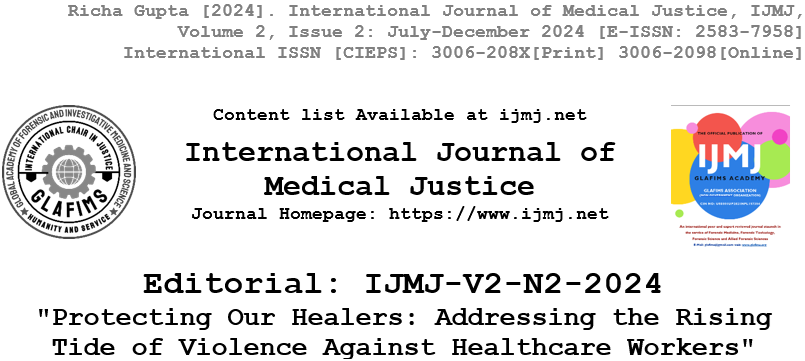Editorial: Protecting our Healers: Addressing the Rising Tide of Violence Against Healthcare Workers
Keywords:
Kolkata Case, Crime, women doctorAbstract
The recent surge of aggression directed towards medical professionals and healthcare practitioners, culminating in the heinous act of sexual assault and subsequent murder of a physician in Kolkata, serves as a dismal indicator of a society in turmoil. Such occurrences are not merely isolated events; rather, they constitute a troubling pattern that jeopardizes the fundamental integrity of our healthcare infrastructure and the security of those who commit themselves to the preservation of human life.
Healthcare practitioners have historically been esteemed as the fundamental support of any operational society. They represent the individuals to whom we confide during our most susceptible times, placing our trust in their expertise regarding our well-being and that of our relatives. Throughout the COVID-19 pandemic, physicians and healthcare personnel were lauded as champions, confronting an invisible adversary on the frontlines, frequently with insufficient resources and at considerable personal peril. Nevertheless, in spite of their steadfast dedication, these same champions are increasingly subjected to incidents of physical aggression, verbal maltreatment, and, in the most alarming occurrences, sexual violence.
The occurrence in Kolkata, wherein a physician was sexually assaulted and ruthlessly murdered, transcends the scope of a mere crime against an individual; it constitutes an affront to the entire medical fraternity and serves as a grave condemnation of our inability to safeguard those who safeguard us. This atrocity is indicative of a more extensive dilemma—a society that appears to be adrift from its ethical bearings, wherein animosity and exasperation are frequently misallocated toward individuals who are least deserving of such hostility.
Several elements contribute to this distressing escalation of violence directed toward healthcare professionals. The healthcare infrastructure in India is excessively strained and inadequately funded, resulting in prolonged waiting periods, insufficient care, and, consequently, patient dissatisfaction. In numerous instances, physicians and nurses become the immediate recipients of this discontent, despite being fellow victims of the same dysfunctional system. The pressure placed upon healthcare workers is profound, with the additional threat of violence further intensifying the stress and burnout that many are already experiencing.
Furthermore, there exists an escalating sense of entitlement and unaccountability among those perpetrating these violent acts. The absence of prompt and decisive measures from law enforcement and the judicial system has engendered a perilous environment wherein offenders presume they can assault healthcare workers without incurring significant repercussions. This situation is exacerbated by a societal attitude that fails to fully comprehend the challenges and sacrifices intrinsic to the medical profession.
The government and healthcare institutions must undertake immediate and robust measures to confront this crisis. Primarily, there must be an unequivocal policy of zero tolerance for violence against healthcare professionals. This necessitates the implementation of stringent laws, effective enforcement mechanisms, and expeditious judicial procedures to guarantee that those who perpetrate such acts are held responsible. Healthcare facilities must also be equipped with enhanced security protocols, including surveillance systems, trained security personnel, and strategies to de-escalate potentially violent encounters.
Education and awareness are equally paramount. Society at large must comprehend the strains faced by healthcare workers and acknowledge that violence is never a permissible reaction to dissatisfaction or frustration. There must be concerted initiatives to restore trust between patients and healthcare providers, underscoring the importance of communication, empathy, and reciprocal respect.
Moreover, the media has a pivotal role in shaping public perception and fostering transformation. It is essential that incidents of violence against healthcare practitioners are reported with accuracy and responsibility, illuminating not only the occurrences themselves but also the broader repercussions for society as a whole.
In conclusion, it is imperative that we address the fundamental challenges inherent within the healthcare system that contribute to patient discontent and dissatisfaction. This encompasses the necessity for enhanced financial investment in healthcare, the augmentation of infrastructure, the reduction of the doctor-to-patient ratio, and the assurance that all individuals have equitable access to timely and sufficient medical services. Tackling these systemic challenges transcends the mere prevention of violence; it is fundamentally about guaranteeing that the healthcare system can effectively and compassionately meet the needs of the populace.
Ultimately, this discourse extends beyond merely safeguarding physicians and healthcare professionals; it pertains to upholding the principles of compassion, respect, and human dignity that ought to be central to our societal framework. Immediate action is required to ensure that these principles are maintained, and that those who provide care can fulfill their roles without the threat of violence or assault. The necessity for reform has been long overdue.
Dr Richa Gupta
Assistant Editor-in-Chief
International Journal of Medical Justice
Associate Professor and Head
Department of Forensic Medicine and Toxicology
Sarojini Naidu Medical college, Agra

Published
How to Cite
Issue
Section
License
Copyright (c) 2024 International Journal of Medical Justice

This work is licensed under a Creative Commons Attribution-NonCommercial 4.0 International License.

